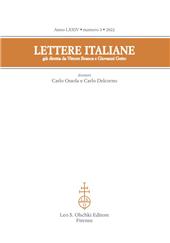Sulle fonti ebraiche del Cantico del Gallo Silvestre
P. 549-560
Il Cantico del Gallo Silvestre è l'unico testo leopardiano ove si faccia esplicito riferimento a fonti ebraiche; indicazione cui, però, i critici e gli studiosi non sono mai stati disposti a dare credito. L'articolo qui presentato tenta al contrario di dare ragione della possibile veridicità di quanto affermato dall'autore, sulla base della riflessione dei pochi che si sono posti il problema dell'interesse del Leopardi per la cultura ebraica, (e in particolare, nell'opera di cui ci occupiamo, per la mistica), e della concreta eventualità che egli si sia realmente ad essa ispirato non solo nella stesura del Cantico, ma, a causa di una certa consonanza di pensiero, nell'intera sua opera, al cui interno essa sarebbe visibile, come in filigrana. La consonanza maggiore è infatti rinvenibile, pur nell'ateismo dichiarato dell'autore, nell'importanza da entrambe le parti accordata al soffrire umano, alla fragilità dei viventi, quella fragilità che pur facendo di ogni cosa un nulla, proprio in quel nulla trova le
The Cantico del Gallo Silvestre is the only Leopardian text where explicit reference is made to Jewish sources; an indication that scholars, however, are unwilling to take seriously. On the contrary, this article seeks to give an account of the possible veracity of the author's statement, based on the remarks of the few who pondered the issue of Leopardi's interest in Jewish culture (and in particular, in the work we are dealing with, in Jewish Mysticism), and of the eventuality that he was inspired by it, not only in drafting the Cantico, but, due to a certain consonance of thought, in his entire work, within which it would be visible as a filigree. The greatest consonance can in fact be found, despite the well known author's atheism, in the importance granted by both to human suffering and to the frailty of the livings, a frailty which, while bringing to naught all the things, finds in itself the basis of its own importance, of its opening up, as if it were a desperate right, to infinity. [Publisher's
Fait partie de
Lettere italiane : LXXIV, 3, 2022-
Articles du même numéro (disponibles individuellement)
-
Informations
Code DOI : 10.1400/292808
ISSN: 2035-6315
DISCIPLINES


